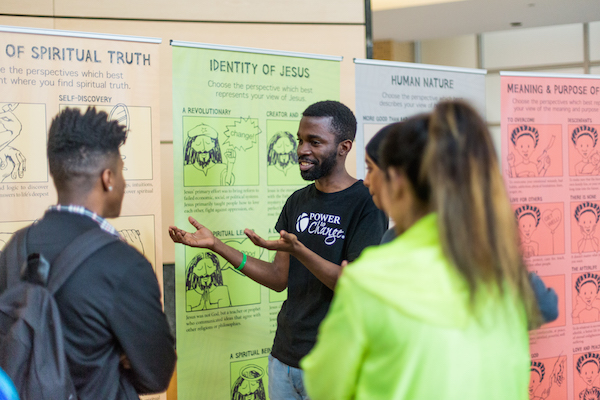 Always driven to prove my worth
Always driven to prove my worth
Is my worth not contingent on the great things I accomplish?
My student life was characterized by a drive to prove my value and worth in multiple domains: career path, academics, sports, image, and social status. I felt like it was all up to me to make great things happen, striving to establish my worth and value in my performance. My tendency to prove my worth also came with me when I joined Power to Change.
In particular, I started to equate my worth and value with something new: my evangelism performance.
The insecure evangelist
It didn’t take me long to figure out that Power to Change valued evangelism. Once I broke through my initial fears I found evangelism was something that I was good at. I thrived off the energy and adrenaline sharing my faith gave me. I also liked the attention and affirmation it brought me when I shared my evangelism stories with fellow Christians.
Over the years, I started to notice my value and worth fluctuated depending on how I felt my evangelism zeal ranked in comparison to others. I either felt pride when I had good evangelism momentum or shame when I didn’t. My sense of value seemed ever more dependent on my evangelism performance. Ironically and sadly, I was often motivated to share my faith based on these feelings of pride or shame.
In order to feel like a good Christian I would share my faith in earnest. When my evangelism intensity waned, I felt shame and thus shared my faith more to make myself feel better. My struggle with performance in evangelism also intensified when I compared myself with others.
Becoming aware of my pride and shame
It was during group times of sharing evangelism stories that my pride and shame surfaced dramatically. Whenever I listened to my peers tell their stories of evangelism I noticed myself reacting in two distinct ways:
1. Shame
Sometimes I found myself envious of their stories of transformation. I wanted their story to be my story to share. In those moments I realized that I was more concerned about getting the attention and affirmation of my peers than rejoicing in God’s work. My worth and value felt at stake. I couldn’t rejoice in God’s work when the messenger wasn’t me. I felt shame when I didn’t have a better story to tell.
2. Pride
In other moments, I couldn’t wait for the person sharing to sit down so I could tell my superior evangelism story. A story that was so much more engaging, and powerful. I would find myself rating each story in comparison to mine. My motives for sharing stories of evangelism were mixed. Part of me wanted God to get the glory, and part of me wanted the glory for myself.
Either response revealed just how self-serving my motivations for evangelism were. I was equating my evangelism rating with my self-worth. Over time, I started to understand why Jesus himself warned his disciples not to do acts of righteousness before others (Matthew 6:1). I started to feel just how hollow and empty it was to seek people’s praise as a measure of my worth. I started to find more value and worth in the work I did for God in secret.
 Photo Credit: Ben Ng
Photo Credit: Ben Ng
Becoming a gospel-centered evangelist
Comparing myself to other evangelists always led to either envy or pride. I was failing to apply the gospel message to my own motivations for evangelism. I needed to put my worth and value as an evangelist in Christ’s work alone. I needed to be motivated to share the message of the gospel in grace alone.
Once I was more aware of my pride and shame, I began to change my posture while sharing evangelism stories with other Christians. Sometimes I shared about my weaknesses in ministry instead. I didn’t feel the pressure to come up with the superior evangelism story in order to feel worthy.
I consciously made an effort not to compare with others, and chose to rejoice in their evangelism stories. I experienced joy in the stories that only God and I knew. Those I kept secret. I am still learning to rejoice in God’s work, even if I am not the person doing the storytelling.
By God’s grace I am increasingly finding my value and worth in Jesus alone and not in my evangelism performance. I see Jesus as both the best evangelist, and the one who justifies me before God and others.





